Oh Violet, she thinks too muchdon't talk to me about tabletop roleplay'96
Don't wanna be here? Send us removal request.
Text
"Art is what makes us human," says the artist.
"No," says the storyteller. "Stories are what make us human."
"Wrong," says the wise person. "You and your friends can make up a bunch of guys and send them to die in a dungeon. You can roll dice to see which of them survive. That shit owns."
3K notes
·
View notes
Text
every time a post goes around about the beauty of tgirl voices and I have to see girls saying stuff like "everyone's but mine" i start to go a little crazy. im locking you in a birdcage and making you sing until you understand your own innate beauty
618 notes
·
View notes
Text
conceptually this is trash, love the art though
How a good tabletop RPG works:
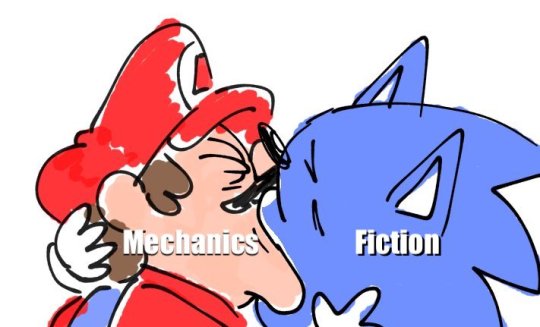
2K notes
·
View notes
Note
uh nothing specific just keep it up 💪 whatever that will mean to you
I have had bronchitis for going on 3 weeks which one of you heathens has that png of me in the family guy death pose
36 notes
·
View notes
Note
I saw your recent video essay/3 hour ttrpg understanding extravaganza and just. DAMN!
You're an excellent mind to listen to discuss a topic so near and dear to my heart. I'm a ttrpg designer with a couple little games; what's your reading list for ttrpg design as a topic? what books, videos, podcasts etc have shaped how you think? because i love the way you think, and would love to know more
Well hello, thank you for my first tumblr ask of all time. 😅 Congrats on tracking this blog down, and I'm glad you liked the video.
First of all, read Luke, Jared and Snow's blogs. Just read whatever strikes your fancy (https://lukegearing.blot.im/, https://jared.blot.im, nerves.games). Snow's most recent post is actually a reading list, I livestreamed a bunch of Luke's posts, and Jared is Jared. If Jared's ideas and opinions sound declarative, that's his voice. I think he dislikes half-committing to ideas, or couching his thoughts, and he has big opinions, so they can come off uh... standoffish? Unfriendly? But he's a big softie, I love him.
For proper philosophy, read Against Procedurality by Miguel Sicart (blog post: https://gamestudies.org/1103/articles/sicart_ap), and his book "Play Matters." His ideas on appropriation and playfulness have literally changed the way I move about the world in my day-to-day. Not every chapter is a banger, but it's good. The Forms and Fluidity of Play by Thi Nguyen is also great (https://gamephilosophy.org/pcg2014/wp-content/uploads/2014/11/C.-Thi-Nguyen-2014.-The-Forms-and-Fluidity-of-Game-Play-PCG2014.pdf), as is Cybertext: Perspectives on Ergodic Literature, even if it was written in the 90's. It's very readable, which is important, but also full of excellent ideas.
I'd also recommend um... just reading a lot of adventures. There's a lot of bad ones, but I trust you to form opinions! I'm currently reading Luke Gearing's Wolves Upon The Coast and loving it for different reasons than I loved his adventure The Isle. I'm a big fan of Mothership's instant classics Dead Planet and Pound of Flesh, and I hear the Warden's Manual in the upcoming Mothership boxed set will have some good practical advice. Dread Manse by Micah Anderson was a recent read I liked a lot. I also love/hate/love Orbital Intelligence, but buyer beware: it's a weird as fuck bibliography. XD Dip a toe in as a treat, and treat all of them (including Crapland) at least a little bit seriously.
Also go watch my Zedeck Siew video and pick up a copy of whatever you think sounds coolest. Spy in the House of Eth is a good start, alongside Lorn Song of the Bachelor and of course Reach of the Roach God (which I haven't read yet, but is available at spearwitch.com). This one's a bit sad because of some recent drama, but the books are still good. Oh, and go listen to the Adventure Tourism podcast, and if my episode on Deep Carbon Observatory sounds cool, go read the original (NOT THE REMASTER).
I will say: Don't read any rulebooks for context. Vanilla Game is alright, but people (including me) have said some really Forge-y stuff about Mothership's mechanisms, DCC is huge and its spells aren't especially fun to read, Best Left Buried is... like, I don't want to say anything bad about it because I was (under)paid to edit it, but ehh.
I say that because a lot of those adventures are for """"OSR"""" games, which people say are inherently high-lethality. This is almost always parroted and twisted to be More Forge Bullshit. The rules don't matter. Most of them are D&D clones in lipstick. I recommended adventures (not rulesets) because they're easily appropriated. Just ask how you would use any piece of them at your table, or how you would change them to fit you or your table. It's a good way to play! It's an inherent part of play. I've said it a million times, but my Mothership home game is 2% Alien, 98% Cowboy Bebop, because fuck the rulebook. I don't like the stress and panic rules anymore. Sorry, Sean!
Let me know if this is coherent or helpful at all, and thanks again for the ask. :)
6 notes
·
View notes
Text
youtube
Alienation, Alienation, Alienation, Alienation, Alienation, Alienation, Alienation, Alienation, Alienation, Alienation, Alienation, Alienation,
1 note
·
View note
Text
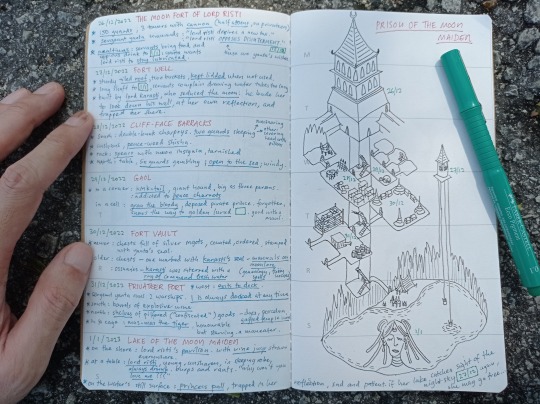
PRISON OF THE MOON MAIDEN
A celestial princess trapped in earth, a suitor trapped in drink, a vizier trapped in profit.
26/12 - 1/1 #dungeon23
An actual dungeon, this time! But also a pirate port and an underground lake? What can I say? I don't know how to write a dungeon.
Wanted to draw Princess Pall in full body lying on the lake's surface. But I don't have the necessary skill ... Also I am fortunate that the map looks so clean, with all my shaky pencil strokes erased. Thank the moon for erasers!
+
Now that #dungeon23 has begun to take the shape of a social-media trend, with people selling workbooks / worksheets for it; folks are talking about: "my dungeon23 project", like publishing is an inevitability---
The warm community spirit of Sean's initial ask seems to be giving way to the cold notion that a few "high-functioning creators" will have finished products by 2023's end, and others will be left out or burn out.
Social media is the market's handmaiden. And this turn in feeling is 100% the market exerting its pressure on us, to turn the things we love doing into work, into commodities.
+
I'm keeping my #dungeon23 with no plan and no outline.
I'm keeping it in my notebook. I am not digitising the text. It must remain uneditable. It must remain as sketches and notes.
This way it doesn't trigger my brain to go: "Okay, you are writing (ie: working) now."
For now, it remains un-instrumentalisable. Unseen and unable to serve the market. Once I'm done with it, who knows? But while I do it it remains play, a way for me to serve myself.
+
Interesting to track unconscious themes that develop over time.
Queen's Rest is turning out to be a town full of held beings, hoping for release: a locked-up parrot mutant; a demon used as an engine; an evil wizard kept at bay; a bunch of ghosts waiting for one last companion; an imprisoned moon fairy ...
Still having fun. One month down, eleven to go!
+
#dungeon23 thing I loved this week: The Cult Of The Burning Tire, by Victor J Merino.
It's a parking-garage dungeon, hell yeah.
42 notes
·
View notes
Text

I feel like they'd approve.
6 notes
·
View notes
Text
“I don’t do math because I’m gay” “the gays can’t do math” “If I explain math on tumblr I’ll lose my gay card” all of you apologize to Alan Turing right now
96K notes
·
View notes
Text
I just opened my advance contributor copy of John Battle's Lilancholy and my eyes immediately teared up. Sincerely humbled to have been a small part of this incredible book.
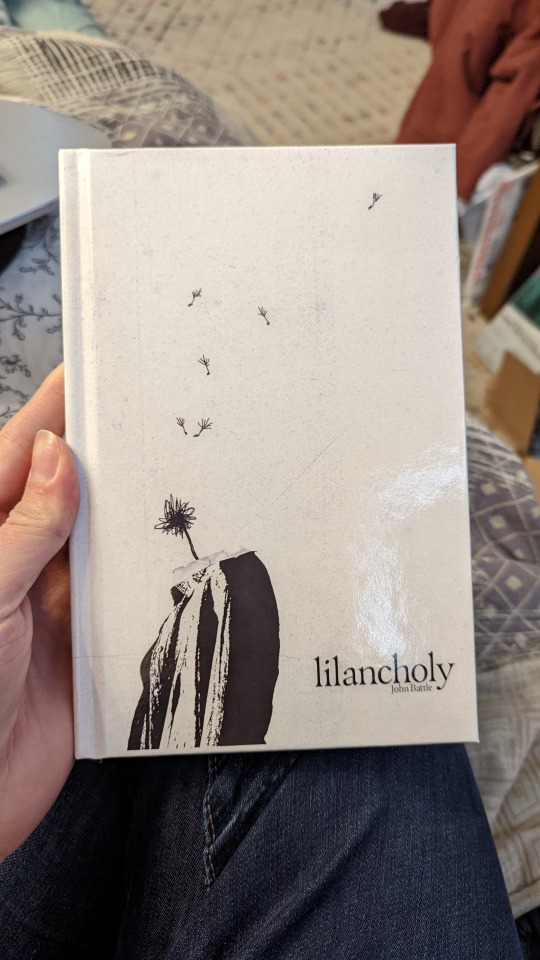
2 notes
·
View notes
Text
What do y'all know about the Parallax RPG? (https://lukegearing.blot.im/parallax-rpg-review)
house of leaves / goncharov esque project consisting of the paratext of a nonexistent text where the described-but-unseen source material is an 800 page rulebook for the worst tabletop game you've ever heard of and the paratext is a series of arguments and blog posts generated by insane forum users
22K notes
·
View notes
Note
First fanart I've seen of Simmons. >3> You're indispensable to the FUA community, Kade.
do you have refs for your fua head-canons?
yeah! I use PureRef (tasch recommended and approved ;3) to keep all of my favorite character drawings and refs on hand.
And a reminder that all visual headcanons of the characters are valid!

its been awhile since i talked abt FUA and ive got time so im gonna ramble a bit abt my design thoughts too

Harley's Desi (indian subcontinent diaspora)!
based on my gay community mentor from when i was first figuring out i was trans (was also desi and a trans man, super cool and helped me during one of my lowest times. much love if youre still following! <3)
his hair is sometimes hard to get right bc like, desi hair tends to fall between straight and curly, but with sooo much volume, it’s so gorgeous
i actually looked up radd's design for harley (click here), along with the only other fanart of harley at the time (click here), before coming up with mine, and i liked radd's design, but i didnt wanna fall into the "black man = deep voice" hole, but also didnt wanna make a tumblr white sexyman podcast design lmao (even tho the VA for harley at the time was hella white and even the current VA ajgsfjkhaha)
i actually drew my, eli's, and radds designs all together once for a textpost! (click here)

Love is Korean, as hinted in the show through her name (Nari).
originally love was tall because i wanted a tall asian lady, but alas. also i thought she was older (the shock when you find out she doesnt know the foundation's reputation for death o-o). you can see her design got a little more soft and energetic to reflect the show's hints that she's like, around 20 or something. i love her <3
love's hair is based on like, my personal experience with having long shiny asian hair. HAIRTIES DONT STAY. every day it would just slip down slightly and make that stupid muchroom shape lmao.
also hair is SUPER IMPORTANT in a lot of asian culture, even in modern day, so long hair bc she's close to her family and still figuring out how to be independent and stuff. also it just looks nice on her, i think she can kick ass with long hair
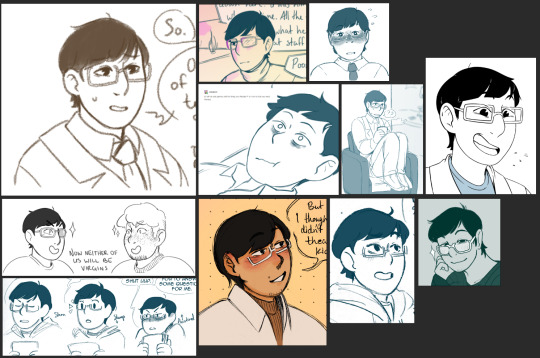
I never actually decided on a specific background for lanc deeper than "Asian", maybe Laos on his dad's side? but I like to think he's pretty americanized (like me lol), so it's not something he thinks about too much.
i honestly don't have much to say on lanc? his design has changed the least, tho i draw him with stubble more often now. also i super project onto him lmao

Klein is white.
her design was based on my boss at the time (and one of my coworkers), who was super charismatic and has a perfect mix of optimism and exhaustion, and who was also fat, and no less wonderful of a person for it. i think a lot of fandoms have a culture of fatphobia (coughmcytcought) and i want to encourage fat characters and designs in our fandom, because hey! we exist!
klein is also the hottest character in FUA
i keep forgetting her scars hfdjkhfd, but yeah she seems reckless enough to have shit blow up in her face (the singing rock that was basically a sound grenade, anyone?) and shes been part of the foundation for awhile
radd doesnt have a lot of drawings of klein posted, but there is the group drawing from awhile back (click here)
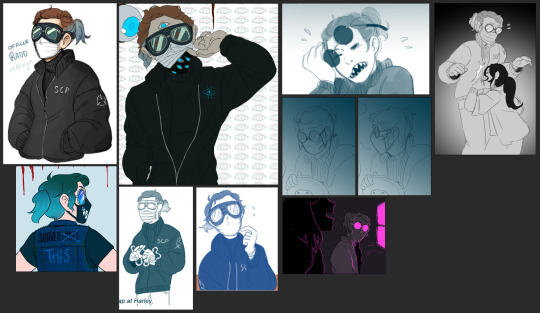
Raddagher is also white. But also. This was not my original design for her.
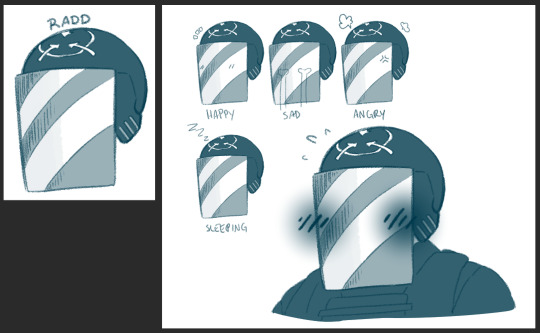
YEAH THATS RIGHT, ALPHA VERSION RADDAGHER WAS JUST A HELMET BECAUSE I THOUGHT SHE WAS HEAVY DUTY SURVEILLANCE HAHAH,, also i thought a big buff faceless security lady was a cool idea. might repurpose the design for an OC in the future
a lot of raddagher’s design is based on radd’s designs, which actually existed before the show iirc, but i wanted some flavor, so goggles and blue hair, and a big comfy security jacket. i have been drawing them with glasses more often tho
the shark teeth doodle is from a joke about radd being part shark
THATS NOT ALL THOUGH. I HAVE ONE MORE THING. THAT’S RIGHT, THE UNVOICED CHARACTERS.
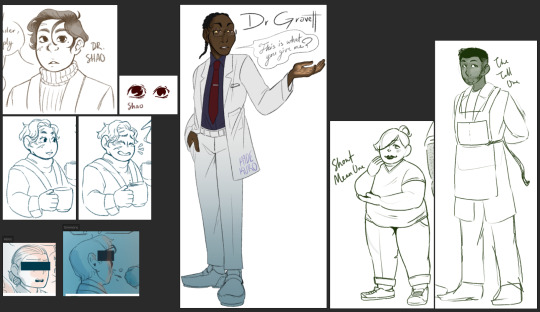
Dr Shao is so wonderful??? Nonbinary Asian and highest ranking member aside from Klein??? the gays keep winning QwQ
Alves and Simmons each cameo in my textpost memes, see if you can find them lol. Their designs are kinda up in the air tbh but I think Simmons is white.
Dr Gravett is based on based on my black coworker that's basically my work mom. her hair is always immaculate, including the style i drew gravett with, which was dutch pigtails. thinking about it maybe she should have more scars considering her personnel file...
The Short Mean One and The Tall One from botany :3 tbh i dont have a lot to say about their designs i just think they’re two pretty besties
also psst check out radd’s designs for upper management too! (click here)
anyways thanks for asking! hopw you enjoyed! imma go pass out now.
60 notes
·
View notes
Text
CRIMINAL SPOTTED IN THE WILD
Taxonomically, how do we define this genre of Creature?






19K notes
·
View notes
Text
When I'm put in charge of dinner:

3 notes
·
View notes
Text
Lovely, as always. <3
Discussing TTRPGs Through 18 Screenshots
When you spend any amount of time in the TTRPG scene you hear two main things. The first is usually from your (my) roots in the scene, which was D&D-posting on reddit. From them you hear a lot about homebrewing. How the rules don't matter as much. But it's not in any thoughtful way. They say it as a way to brush away criticism or to attach silly new rules to what was already there. They don't mean it in any sort of analytical, critical, artistic, or other way. It's annoying and useless.
The second thing you (I) learn, after leaving that scene and exploring what are most commonly referred to as Storygames, things like Apocalypse World, Monster Hearts, and other, non-PbtA games, is that, no, those D&D folks were wrong. The rules do matter. The rules are what makes the game unique from D&D and worthy of its own style of play. I believe this is where I first heard of Design Intent. PbtA games were more likely to have design intent behind them, whereas D&D was just a collection of legacy systems from previous editions, meant to capture the then-dwindling group of old school players who were flocking to literally anything but 4e.
The idea that the rules do matter was very good for my mind at the time. It is what gave me the courage to be a game designer and not a 5e homebrew person. But as an artist I found myself disagreeing with a lot of the storygame personalities on to what degree the rules mattered. Were they the ultimate arbiter? Were they just suggestions? Were they the perspective of the creator? Worldbuilding?
I think the first time I disagreed was when introduced to the Big Three. I heard of them first through Adam Koebel's "First Look" streams that were uploaded to youtube. But they were originally created by Jared Sorenson back in 2005 and used to teach Game Design seminars.
I'm not here to talk specifically about the Big Three. You can read about them here.
On an design level, I think the Big Three is ultimately not my jam. I do not dig it. From an analytical level? Sure. I think having different lenses to analyze games is good. But teaching it as *how* to design games is just not what I'm here for.
Since then, there have been other things I disagreed with. And since then I've been looking for others whose thoughts more closely align to what I felt but couldn't quite put words to.
Enter Miguel Sicart. He's an associate professor in Copenhagen at their IT University. You can read about him here. But the main thing I want to focus on is his article he wrote titled "Against Procedurality."
I must note here that this article (and I believe most of Miguel's writings on games) focuses specifically on video games. But the ideas present paint interesting parallels to how I feel about TTRPGs. I'm hoping by discussing certain sections of his article I can elaborate and help solidify my own position on games and game design.
Perhaps others out there like me will also find it useful. So here we go. Here is me discussing TTRPGs Through 18 Screenshots.

These first few screenshots focus around Sicart defining the beliefs of noted Proceduralists within video game criticism. Here he defines one of the beliefs of the Proceduralists and what they believe the purpose of games are (excuse my poor highlighting).
A proceduralist believes "games are frameworks that designers can use to model the complexity of the problems that face the world and make them easier for the players to comprehend."
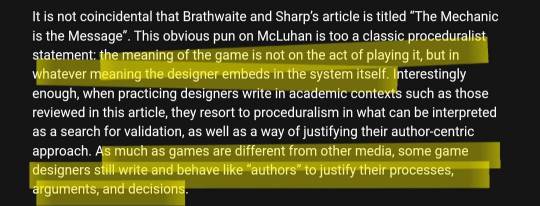
Here he solidifies it by saying that: "The meaning of the game is not on the act of playing it, but in whatever meaning the designer embeds in the system itself." This reminds me of the Big Three.
He also begins to poke and prod at these definitions of game. He says, "As much as games are different from other media, some game designers still write and behave like 'authors' to justify their processes."
What he's saying here is that games are ultimately played, yet you have game designers acting as final arbiters for what the meaning of that play is. And he disagrees with that.
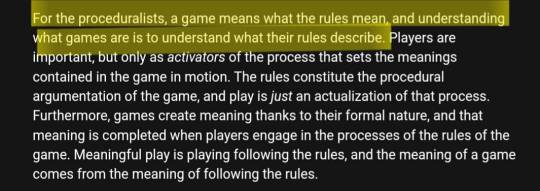
"A game means what the rules mean, and understanding what games are is to understand what their rules describe." To proceduralists, the act of play is "just an actualization" of the rules, which contain the games meaning/argument. "Meaningful play is playing following the rules, and the meaning of a game comes from the meaning of following the rules."
I can't help but think of the infamous rule in Dungeon World that simply states, "Follow the rules."

Here Sicart needles more. He brings up an example of a game where the designer claimed he "wanted to use game rules to explain something invisible but real." But Sicart says, "However, the interesting failure of this game is that the designer has to include (...) an explanation of the rules and what the game means."
Sicart's argument is that it's strange to say that the rules/procedures contain the meaning of the game, yet still designers have a "mistrust" in the player. The designers fear the players won't "complete the meaning of the game in the way the designer thinks is appropriate."
Things are obviously different in TTRPGs. We write game books in order to lay out the rules and things like that. But what Sicart says still holds true. If we must then explain the rules and lay out their implicit meaning, what is it we are trying to say? If the rules matter and the message is in the rules, can we not trust the players to find that meaning through play without the need to editorialize them?
If a designer has to tell you the meaning of their game, is that a failure of the rules? Of the player? Or of the designer? Is it a failure at all? Is there a purpose in being told the intended meaning of a game? I think we can stand to ask and answer these questions more.

Sicart continues to needle in on editorializing by mentioning another designer. This designer claimed that their game had many interpretations yet still published an author's statement. Sicart argues, rightfully so I think, that an artist statement will "obviously affect the way the game is interpreted."
Sicart says that even for proceduralists who believe the rules and procedures of the game hold its meaning, those game designers still have to make sure their players "get" the game.
He concludes this section with: "If rules contain the meaning, what is the need for an author statement?" I think it's a good question with any number of possible answers. None of which are answered through the proceduralists argument though. None of which can be answered by "the rules."

To Sicart, Proceduralism is saying that: "Playing, then, becomes accepting and learning from the system-based message embedded in the game."

This section is important to me for not only the highlighted section, but also for the last bit. Sicart draws comparisons from Proceduralists to the Enlightenment, calling it a "determinist approach to play." Meaning that everything is determined prior to play and all else is denied.
"Games have meaning prior to the act of playing the game, and somewhat determine the meaning of the game; there is an essence to any game, and that essence is to be found in the rules."
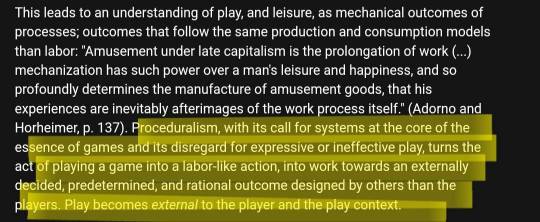
Sicart continues to rail on this idea that proceduralists are essentially cutting the player off from creating their own meaning. That everything is set up for the player and the player ultimately has no input. They are merely acting out the proper actions in the proper order to get the designer's meaning. "Play become external to the player."
I think this is part of why I disagree with System Matters talk in TTRPGs. In a medium so often dictated by a small group of people sat around a table (or online), the idea that the rules hold more weight than those people seems silly to me. The idea the book holds the entire meaning of its own play is also one I disagree with.

Sicart reframes everything into a definition of what he believes play is. "Play is appropriation, creation, expression, and to a certain extent submission to the rules of a game. Play is everything about a player engaged in a game, and less about the rules of such a game."
This reframing really clicked with me. Because I too cannot deny the importance of the rules within a game. But to me their importance comes from interaction with them, which puts the agency and power at the hands of the player. A rule on its own is nothing, especially without enforcement from the designer.
I think to dig into this thought more, I would never say that the rules are merely "guides" or "suggestions" either. I would say a rule is a rule. Just as a stop sign is a stop sign. But we all have beliefs, feelings, and reactions to rules. We all interact with them differently and navigate them in conforming and non-conforming ways. That, to me, is where the essence of play can be found.
Even in the case of video games, as Sicart is arguing for, the rules and how we interact with them are the essence of humanity in play. Speedruns are not part of the rules. Nuzlocke's are not part of the rules. Getting OoB in Halo 2 and fucking around to make a music video for Papa Roach's "Last Resort" is not part of the rules. Yet, all are play and all are part of the game.

Here Sicart reaches to two people and their definitions of Play. I personally do not have a concrete definition for Play at this point in my career. I default to the "I'll know it when I see it" definition. But these two are each very human-centric, which I appreciate. I'll type them below for your reading.
Caillois defines play as "a free and voluntary activity, a source of joy and amusement (...) play is a separate occupation, carefully isolated from the rest of life, and generally is engaged with precise limits of time and place."
Eugen Fink says, "From the beginning, play is a symbolic act of representation, in which human life interprets itself. Human play is a creation through the medium of pleasure of a world of imaginary activity."

Sicart, in trying to find his own meaning to Play says the following: "The meaning of a game cannot be reduced to its rules, nor to the behaviors derived from the rules, since play will be a process of appropriation of those rules, a dialogue between the system and the player." This, I think, gets to the root of what I believe in regards to TTRPGs and the act of play.
The thing that System Matters or System Doesn't Matter misses is that the act of playing a TTRPG will always hold *both* at the same time, and as Sicart quotes, it's holding both of those together that "the notion of playing well" is created.
To me, a TTRPG will always be about how the System both Matters and Doesn't Matter. In constant conversation. And then the analytical side of it is sitting and asking, "in what ways do the system matter?" instead of just citing that it does. And also, "in what ways did the system not matter?" Instead of just, again, citing that it doesn't.

Sicart talks much more in depth about his own definition of Play, but this part stands out to me as useful when thinking about TTRPGs. He says that the meaning of a game cannot be located exclusively to the rules. And that "This (...) liberates us from considering that players are determined and conditioned by the game rules; in fact, it considers that the player can be reflective precisely by abandoning the rule-determinism."
Sicart explains that the player can find meaning in the act of playing instead of "winning the game" or simply following its procedures. I'm reminded of Big Joel's video on Sinistar, in which Joel talks about missing an important piece of context from the rules, turning a fun, space-shooter into a horrifying experience with the indestructible.
"The game, if properly constructed, presents not so much a challenge - in the usual sense of the word - as an opportunity to experience possibility." This means that there is more to play than following rules or procedures. It means that deciding to enact play is itself an important part of games. Having *any* experience, whether brought on by the rules or brought on by anything else, is the goal of play and of games in general.
I would have to agree.

Sicart summarizes these thoughts nicely here. "The meaning of a game, its essence, is not determined by the rules, but by the way players engage with those rules, by the way players *play*. The meaning of games, then, is played, not procedurally generated."

Sicart, arguing for his understanding, says that "if the meaning of a game is to be found in its rules (...) then players who do not understand the meaning (...) are playing the game wrong." And I sometimes see this argument in TTRPG spaces. That you can play a system wrong and instead of doing so you should play another system. And surely there are arguments to be made, especially when trying to counter the prevalence of "just homebrew it" anti-ideology from the DnD stans that seeks to crush the discussion of games under its heel. But I also don't think that applies all the time.
In TTRPGs it feels like there are two different conversations happening at once. Sometimes more than two. More than I can count. It's hard to say one argument is wrong when it's being used to stop, say, D&D stans from denigrating indie games. But when those arguments are then relitigated unchanged into new conversations, I begin to see the limits of System Matters ideology.
As an aside, I personally think arguing against D&D on the basis of system is missing the forest for the trees. WotC, as it stands now, not just in the past, is a racist and horrible company. We have plenty of first-hand accounts from creators *in our spaces* to justifiably say that without the need to argue with DnD stans.
From an analysis stand point, plenty of good words have been written pointing out the racist/sexist/xenophobic nature of the original D&D and those same beliefs in its creators. But I believe, at this point, that the true argument against D&D is against WotC. As a company.
They are a blight on our industry. An act of violence enacted on indie creators (literally, i'm not being dramatic). Its employees (Mike Mearls in particular) have engaged in targeted harassment against indie creators. Supporting the company is Not Good and I can't really abide by it.
I think continued analysis of the systems in place are good for furthering the nature of TTRPG discourse. But I don't believe it lies in strictly System Matters arguments. Because plenty of work has been done by indie creators to rectify harmful practices and ideas in the D&D system while making their own dungeon crawling systems.
Plenty of anti-D&D discourse based solely on its system can often be blown out of proportion and used to tear down indie creators trying to reclaim a style of play that they enjoy. The entire "Heartbreaker" discourse is still around to some degree, as an example.
To me, I would draw comparison with Lovecraftian Horror and its continued reclamation by queer, black, and POC writers. We know Lovecraft is racist. We have known since before he died. But that doesn't stop folks from being able to reclaim it for themselves. And I'd go a step further and say that, anyone who defends Lovecraft (and his racist practices) aren't doing so in any sort of good faith worth arguing against. They are simply racists and xenophobes. We can call a duck and duck.
I would say the same for D&D stans who defend its racism. Arguing with them about system is, again, missing the forest for the trees. These are just racists and xenophobes using a dead man's words to justify continued racism and xenophobia. We have other arguments to be had with them that cannot be countered with "well, it's in the rules."
We should also push them out of our spaces because they are racist. Like, full stop.
I think an argument against this line of thought could be that newer people who don't know any of this stuff need an avenue to learn it. To which I agree and think it still would be better to argue on the basis of WotC being a horrible company and its defenders being racist, as opposed to arguing that D&D is a bad game.
We can oppose bigotry on ethical grounds while also pointing to dungeon crawling alternatives by queer, poc, and black creators. By pointing to the folk doing the work of reclamation. Not to say that all new players should play dungeon crawlers. I'm merely talking specifically about those who wish to play D&D 5e. We can steer them to safer pastures and away from the harmful ideology and practices of WotC and 5e.


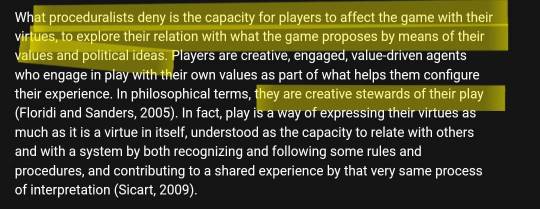
Okay, I went on a little tangent there. I think I might be trying to have more than one conversation at a time. Something as broad as Play is complicated to talk about.
To wrap this up, Sicart pushes against proceduralism once again. To him, proceduralists believe that a game is designed with purpose in mind and it's in following the games systems that the player is given that purpose. But Sicart says, "play is much more messy than just playing for goals and achievements." Or, to put it into the context of the Big Three in ttrpgs, a game is more than just how it incentivizes its players.
"In the proceduralist realm, players do not express themselves by play, they express the designers by means of their action guided by the rules. What procedularists deny is the capacity for the players to affect the game with their own virtues, to explore their relation with what the game proposes by means of their values and political ideas. They are creative stewards of their play."
To Sicart, a games procedures don't give players virtues. The game doesn't teach a player how to Be. The game simply exists and through the act of play, the player enact their own virtues onto it. Not to say that a game cannot have its own virtues, but that a game's virtues don't imply the player's virtues. And more importantly, it's through play that the player has the agency to enact those virtues with or against the games.
I wrote yesterday on twitter about why I find stories about hurt and pain beneficial. I said that those things are human. Rage, pain, violence, depression, grief. "When things get so hard you don't even feel like a real person anymore." I say stories like that are important because they show us that it's human to feel those things. Even if we don't talk about what it's like to be supremely angry, or talk about what it's like to suffer so greatly, in art we can see that others have felt it as well. Because they are human.
I think the difference between traditional media and ttrpgs is that we get to enact our own virtues. We have a true form of Agency. We get to assert against or with a games rules that we too are human. That we are more than rules and procedures. We are what we believe of those things and what we think of those things. We hold the act of rebellion and the act of submission within us. We are multi-faceted and not contained.
The importance of games, then, to me, is to show us that we are human. Even in a world that seeks to treat us as less-than. To play is to enact our agency upon *a world* in the face of our world, which pushes us to labor. Most likely until we die. To play is the essence of humanity. And to play TTRPGs is to mesh with the humanity of others.
36 notes
·
View notes

